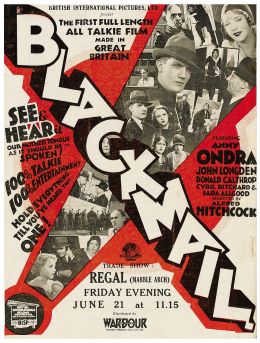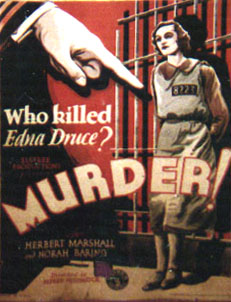Related Research Articles

Young and Innocent, released in the US as The Girl Was Young, is a 1937 British crime thriller film directed by Alfred Hitchcock and starring Nova Pilbeam and Derrick De Marney. Based on the 1936 novel A Shilling for Candles by Josephine Tey, the film is about a young man on the run from a murder charge who enlists the help of a woman who must put herself at risk for his cause. An elaborately staged crane shot Hitchcock devised, which appears towards the end of the film, identifies the real murderer.

The LaserDisc (LD) is a home video format and the first commercial optical disc storage medium, initially licensed, sold and marketed as MCA DiscoVision in the United States in 1978. Its diameter typically spans 30 cm (12 in). Unlike most optical-disc standards, LaserDisc is not fully digital, and instead requires the use of analog video signals.

The Lodger: A Story of the London Fog is a 1927 British silent thriller film directed by Alfred Hitchcock and starring Marie Ault, Arthur Chesney, June Tripp, Malcolm Keen and Ivor Novello. Hitchcock's third feature film, it was released on 14 February 1927 in London and on 10 June 1928 in New York City. The film is based on the 1913 novel The Lodger by Marie Belloc Lowndes and the play Who Is He? co-written by Belloc Lowndes. Its plot concerns the hunt for a Jack the Ripper-like serial killer in London.

Secret Agent is a 1936 British espionage thriller film directed by Alfred Hitchcock, adapted from the play by Campbell Dixon, which in turn is loosely based on two stories in the 1927 collection Ashenden: Or the British Agent by W. Somerset Maugham. The film stars Madeleine Carroll, Peter Lorre, John Gielgud, and Robert Young. It also features uncredited appearances by Michael Redgrave, future star of Hitchcock's The Lady Vanishes (1938), Michel Saint-Denis as the Coachman, and Michael Rennie in his film debut.

The Mountain Eagle is a 1926 silent drama film, and Alfred Hitchcock's second as director, following The Pleasure Garden. The film, a romantic melodrama set in Kentucky, is about a widower who jealously competes with his crippled son and a man he loathes over the affections of a schoolteacher. The film was mostly produced at the Emelka Film studios in Munich, Germany in autumn of 1925, with exterior scenes shot in the village of Obergurgl in the State of Tyrol, Austria. Production was plagued with problems, including the destruction of a village roof and Hitchcock experiencing altitude sickness. Due to producing the film in Germany, Hitchcock had more directorial freedom than he would have had in England, and he was influenced by German cinematic style and technique.

The Criterion Collection, Inc. is an American home-video distribution company that focuses on licensing, restoring and distributing "important classic and contemporary films". Criterion serves film and media scholars, cinephiles and public and academic libraries. Criterion has helped to standardize certain aspects of home-video releases such as film restoration, the letterboxing format for widescreen films and the inclusion of bonus features such as scholarly essays and commentary tracks. Criterion has produced and distributed more than 1,000 special editions of its films in VHS, Betamax, LaserDisc, DVD, Blu-ray and Ultra HD Blu-ray formats and box sets. These films and their special features are also available via The Criterion Channel, an online streaming service that the company operates.

Blackmail is a 1929 British thriller directed by Alfred Hitchcock and starring Anny Ondra, John Longden, and Cyril Ritchard. Based on the 1928 play of the same name by Charles Bennett, the film is about a London woman who is blackmailed after killing a man who tries to rape her.

Waltzes from Vienna is a 1934 British biographical film directed by Alfred Hitchcock, sometimes known as Strauss' Great Waltz. It was part of the cycle of operetta films made in Britain during the 1930s.

The Ring is a 1927 British silent romance film written and directed by Alfred Hitchcock and starring Carl Brisson, Lillian Hall-Davis and Ian Hunter.

Downhill is a 1927 British silent drama film directed by Alfred Hitchcock, starring Ivor Novello, Robin Irvine and Isabel Jeans, and based on the play Down Hill by Novello and Constance Collier. The film was produced by Gainsborough Pictures at their Islington studios. Downhill was Hitchcock's fourth film as director, but the fifth to be released. Its American alternative title was When Boys Leave Home.
Number Seventeen is a 1932 comedy thriller film directed by Alfred Hitchcock and starring John Stuart, Anne Grey and Leon M. Lion. The film, which is based on the 1925 burlesque stage play Number Seventeen written by Joseph Jefferson Farjeon, concerns a group of criminals who commit a jewel robbery and hide their loot in an old house over a railway leading to the English Channel. The film's title is derived from the house's street number.

Murder! is a 1930 British thriller film co-written and directed by Alfred Hitchcock and starring Herbert Marshall, Norah Baring and Edward Chapman. Written by Hitchcock, his wife Alma Reville and Walter C. Mycroft, it is based on the 1928 novel Enter Sir John by Clemence Dane and Helen Simpson. It was Hitchcock's third all-talkie film, after Blackmail (1929) and Juno and the Paycock (1930).
Champagne is a 1928 British silent comedy film directed by Alfred Hitchcock and starring Betty Balfour, Gordon Harker and Jean Bradin. The screenplay was based on an original story by writer and critic Walter C. Mycroft. The film is about a young woman forced to get a job after her father tells her he has lost all his money.

"Flashback" is the 44th episode of the American science fiction television series Star Trek: Voyager airing on the UPN network. It is the second episode of the third season.

The Man Who Knew Too Much is a 1934 British spy thriller film directed by Alfred Hitchcock, featuring Leslie Banks and Peter Lorre, and released by Gaumont British. It was one of the most successful and critically acclaimed films of Hitchcock's British period.

Mary (1931) is a British-German thriller film, directed by Alfred Hitchcock, and is the German-language version of Hitchcock's Murder! (1930), shot simultaneously on the same sets with German-speaking actors. The film is based on the 1928 book Enter Sir John by Clemence Dane and Helen Simpson, and stars Alfred Abel and Olga Tschechowa. Miles Mander reprises his role as Gordon Druce from Murder!, though the character's name was changed to Gordon Moore.

Jamaica Inn is a 1939 British adventure thriller film directed by Alfred Hitchcock and adapted from Daphne du Maurier's 1936 novel of the same name. It is the first of three of du Maurier's works that Hitchcock adapted. It stars Charles Laughton and Maureen O'Hara in her first major screen role. It is the last film Hitchcock made in the United Kingdom before he moved to the United States.

Elstree Calling is a 1930 British comedy musical film directed by Adrian Brunel and Alfred Hitchcock at Elstree Studios.

The Lady Vanishes is a 1938 British mystery thriller film directed by Alfred Hitchcock, starring Margaret Lockwood and Michael Redgrave. Written by Sidney Gilliat and Frank Launder, based on the 1936 novel The Wheel Spins by Ethel Lina White, the film is about a beautiful English tourist travelling by train in continental Europe who discovers that her elderly travelling companion seems to have disappeared from the train. After her fellow passengers deny ever having seen the elderly lady, the young woman is helped by a young musicologist, the two proceeding to search the train for clues to the old lady's disappearance.